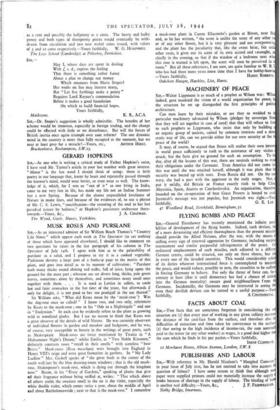MUSK ROSES AND PURSLANE
SIR,—As an interested admirer of Sir William Beach Thomas's " Country Life Notes" which appear each week in The Spectator (to say nothing of those which have appeared elsewhere), I should like to comment on two questions he raises in the last paragraph of his column in The Spectator of July 14th. I agree with him as to the palatability of purslane as a salad, and I propose to try it as a cooked vegetable. Parkinson devotes a large part of a foolscap page to the merits of this plant, and goes into detail as to its manner of cultivation: " Purslane Bath many thicke round shining red stalks, full of juice, lying upon the ground for the most part ; whereon are set divers long, thicke, pale green leaves, sometimes alone by themselves, and sometimes many small ones together with them. . . . It is used as Lettice in sallets, to coole hot and faint stomackes in the hot time of the yeare, but afterwards if only for delight, it is not good to bee too prodigall in the use thereof."
Sir William asks, " What did Keats mean by the musk-rose '? Was the dog-rose once so called? " I know two, and two only, references by Keats to the musk-rose ; one in his " Ode to a Nightingale " and one in " Endymion." In each case he evidently refers to the plant as growing wild in woodland glades. But I see no reason to think that Keats was a great observer of the details of wild Nature. He was certainly observant of individual flowers in garden and meadow and hedgerow, and he was, of course, very susceptible to beauty in the writings of great poets, such as Shakespeare. Musk-roses are twice mentioned by Titania in " A Midsummer Night's Dream," whilst Emilia, in " Two Noble Kinsmen," definitely contrasts roses " royal( in their smells " with scentless " base Briers." Musk-roses (Rosa moschata) were brought into England in Henry VIII's reign and were great favourites in gardens. In " My Lady Ludlow " Mrs. Gaskell speaks of " the great bush at the corner of the south wall just by the blue drawing-room windows ; that is the old musk- rose, Shakespeare's musk-rose, which is dying out through the kingdom now." Bacon, in his " Essay of Gardens," speaking of plants that give off their fragrance without being sniffed at, writes : " That which above all others yields the sweetest smell in the air is the violet, especially the white double violet, which comes twice a year, about the middle of April and about Bartholomewtide ; next to that is the musk-rose." I remember a musk-rose plant in Canon Ellacombe's garden at Bitton, near Ba and, as he has written, " the scent is unlike the scent of any other r or of any other flower, but it is very pleasant and not overpowering and the plant has the peculiarity that, like the sweet briar, bin un other roses, it gives out its scent of its own accord and nnsought, chiefly in the evening, so *hat if the window of a bedroom near wh this rose is trained is left open, the scent will soon be perceived in room." But all these references, I am sure, are quite familiar to W. B. T who has had three more years more time than I have for hobby-hun
—Yours faithfully, HARRY ROBERTS. Oakshott Hanger, Hawk ley, Liss, Hants.


























 Previous page
Previous page